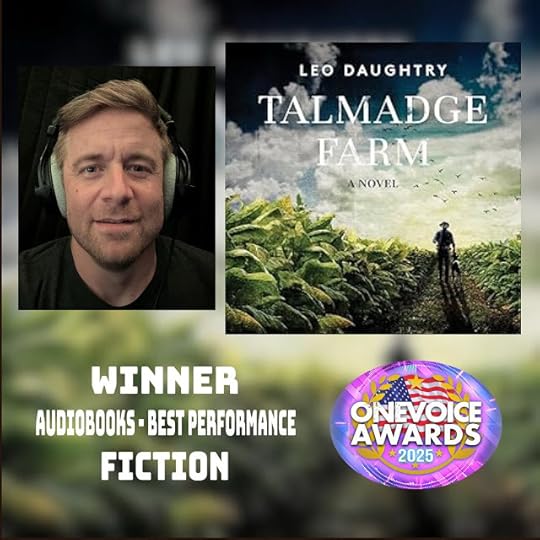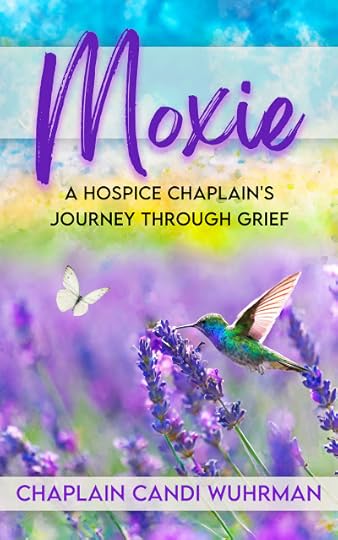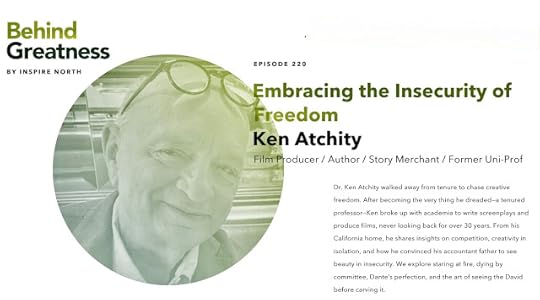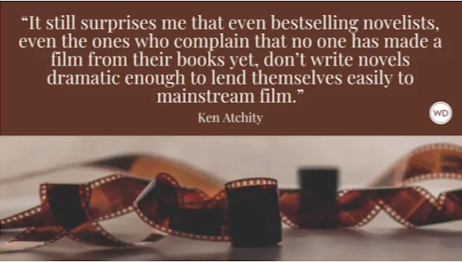Kenneth Atchity's Blog
September 3, 2025
Justin Price Wins The One Voice Award!
BIG Congratulations to the talented Justin Allen Price Voice Over WINNER of the One Voice Award for best performance of an audiobook/fiction for his narration of Story Merchant Book's Talmadge Farm by Leo Daughtry - Author - Talmadge Farm!

You can now LISTEN to Talmadge Farm on Audible!
Get your audiobook on Amazon Now!!
August 27, 2025
NEW From Story Merchant Books: A Hospice Chaplain's Journey Through Grief

Death doesn't change love. The ability and theway our loved ones express their love is what changes."
In Moxie, author Candi Wuhrman invites readers on an introspectivejourney through the griefs of life, weaving together personal anecdotes,spiritual insights, and profound reflections on the human experience.
With a blend of vulnerability and wisdom, Wuhrmanshares heartfelt stories of love, loss, and resilience, inviting readers toembrace their inner strength and tap into the boundless energy of the spirit.
Through the lens of her experience as a hospicechaplain, Moxie explores the power of grief processing, the beautyof human connection, and the profound impact of embracing life's challengeswith courage and grace. From navigating the depths of sorrow to celebratingmoments of joy and revelation, Moxie offers a roadmap for findingmeaning and purpose in the face of adversity.
August 25, 2025
Ken Atchity – Embracing the Insecurity of Freedom

Behind Greatness sits down with Dr. Ken Atchity at his home in California. Ken started his adult life on an academic stream and he eventually became what he personally dreaded: a tenured professor. But, shortly after his tenure-ship, he decided to breakup with his career and start anew. Already an author, Ken decided to write screenplays and produce films – not ever looking back for over 30 years. as been producing films since 1996.
He talks about his thoughts on competition, creativity and what it hinges on, doing great work in isolation and how he turned around his accountant dad to seeing the freedom and beauty in insecurity.
He talk staring at fire and mountains, dying by committee, the perfection of Dante’s Divine Comedy, chopping wood – and the Rose Café.
Seeing the David before carving it.
August 20, 2025
How to Design Your Novel For Film Adaptation

Mid-career novelists seeking representation complain that none of their books have been made into films. At any given moment, we in Los Angeles have literally stacks of novels from New York publishers on our desks. Going through them to find the ones that might make motion pictures or television movies, we—and other producers, managers, and agents—are constantly running into the same problems.If you regard your writing career as a business, you should be planning your novel at the drawing board to make it appealing to filmmakers. Here's how.Common Problems in Novel-To-Film Adaptation“There’s no third act…it just trickles out.”“There are way too many characters and it’s not clear till page 200 who the protagonist is.”“I can’t relate to anyone in the book.”“At the end, the antagonist lays out the entire plot to the protagonist.”“There’s not enough action.” Not just action but dramatic action.“There’s nothing new here. This concept has been used to death.”/“We don’t know who to root for.”“The whole thing is overly contrived.”“There’s no dialogue, so we don’t know what the character sounds like.”“There’s no high concept here or a new way into a familiar concept. How do we pitch this?”“There’s no real pacing.”“The protagonist is reactive instead of proactive.”“At the end of the day, I have no idea what this story is ”“The main character is 80, and speaks only Latvian.”“There are no set pieces.”
Of course anyone with the mind of a researcher can list a film or two that got made despite one of these objections. But for novelists who are frustrated at not getting their books made into films that should be small consolation and is, practically speaking, a futile observation. Yes, you might get lucky and find a famous Bulgarian director, who’s fascinated with the angst of octogenarians, studied pacing with John Sales or Jim Jarmusch, and loves ambiguous endings.
But if you regard your career as a business instead of a quixotic crusade, you should be planning your novel at the drawing board to make it appealing to filmmakers.
Characters are the most important element of the story and should generate the action, the setting, and the point of view. Your job as a writer is to give us insight into each and every character in your story, no matter how evil or virtuous his or her actions may be. Characters are the heart of the drama.
Have someone in the film industry read your synopsis or treatment before you commit to writing the novel.
Revise accordingly.
Though I’ve observed the phenomena for several decades now, it still surprises me that even bestselling novelists, even the ones who complain that no one has made a film from their books yet, don’t write novels dramatic enough to lend themselves easily to mainstream film. It’s a well-known, but lamentable, phenomenon in publishing that, with very few exceptions, the more books a novelist sells the less critical his publisher’s editors are of his work. So time and again we read novels that start out well, roar along to the halfway point, then peter off into the bogs of continuous character development or action resolution.
A publisher invests between $25,000 and $100,000 or more in publishing your novel. A low-budget feature film from a major Hollywood studio today costs at least $50 million. There is, from a business point of view, no comparison. Risking $50 million means the critical factor is raised as high as can be imagined when your book hits the “story department”—much higher than the critical factor of even the biggest publishers. Hollywood studies what audiences want by keeping track, in box office dollars, cents, and surveys–what they respond best to.
If you want to add film to your profit centers as a novelist, it would behoove you to study what makes films work. Disdaining Hollywood may be a fashionable defense for writers who haven’t gotten either rich or famous from it, but it’s not productive in furthering your cinematic career or building your retirement fund.
via Writer's Digest
Brian A. Klems is the editor of this blog, online editor of Writer’s Digest and author of the popular gift bookOh Boy, You’re Having a Girl: A Dad’s Survival Guide to Raising Daughters.
Follow Brian on Twitter: @BrianKlems
Sign up for Brian’s free Writer’s Digest eNewsletter: WD Newsletter
Listen to Brian on: The Writer’s Market Podcast
August 18, 2025
WHAT IS A STORY?
August 15, 2025
Don’t put a deadline on your dreams!
Persistence is showing up for your writing—even when no one’s reading yet.
With one-on-one coaching, you’ll get the support, structure, and belief to keep going until your voice breaks through.
Visit: https://lnkd.in/ga6yvEBJ or
Contact Ken: atchity@storymerchant.com
August 12, 2025
WRITE TO MAKE A DIFFERENCE!
Let's go ahead and answer that question.
August 11, 2025
Live beyond opinions Dr. Ken Atchity
ascendra – Your Daily Dose of Motivation!
August 9, 2025
Story Merchant Book Author Leo Daughtry's Author talk in Charlotte at The Sharon at Southpark!
Former North Carolina political leader Leo Daughtry brings the rich stories of the South to life through his debut novel, Talmadge Farm.
Leo's thought-provoking discussion on heritage, politics, and storytelling rooted in the rural South brings the voice behind Talmadge Farm.
August 6, 2025
Tobe Roberts, Senior Associate Manager at Atchity Productions Joins Kevin Smith's Birthday Bash!
Tobe Roberts joins Kevin Smith's 55th Birthday Bash at his comic book store, Jay and Silent Bob's Secret Stash in Red Bank, New Jersey.

A comic book writer, author, comedian/raconteur, and internet radio personality, he is best known for his films "Clerks" (1994), "Jay and Silent Bob Strike Back" (2001), and "Clerks II" (2006) and his character Silent Bob. "Clerks: The Animated Series" (an adult sitcom) aired for a short time on ABC-TV starting in May 2000. (In 2019, "Clerks" was selected by the Library of Congress for preservation in the United States National Film Registry for being "culturally, historically, or aesthetically significant.")




